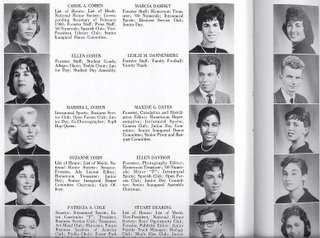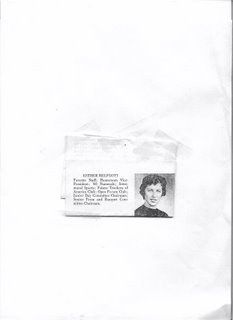The Fall 2005 issue of
American Imago came in the mail this weekend. It's an important compendium of essays on various forms of imprisonment. I am pleased to say that my essay,
Analytic Entrapment , concerning my psychoanalytic experience is included. I thank Peter L. Rudnytsky, editor of
American Imago and Murray M. Schwartz, guest editor, for their important comments while the essay was in progress and for the integrity they demonstrate in printing an essay from the analysand's point of view.
Abstract:
This essay examines a four-and-a-half year, five-day-a-week psychoanalysis, with a traditional male analyst, from the point of view of a female analysand. Drawing on diaries she kept during this period, January 1990 – June 1994, as well as on those she wrote before and after the analysis, the author argues that an erotic transference that is not supervised well by the analyst, especially when he does not control his erotic countertransference, can produce feelings of psychological entrapment on the part of the analysand. The analyst’s refusal to deal with the here and now between him and the analysand can damage an otherwise creative analytic relationship and it can threaten psychoanalysis as an art form.The essays can be accessed through
Project Muse at any university library. In Seattle, at Suzzallo, our wonderful librarians (I adore librarians. How would we live without them!)on the periodicals floor will offer you a friendly hand.
American Imago Volume 62, Number 3, Fall 2005
Special Issue: Experiences of Imprisonment
Guest Editor: Murray M. Schwartz
The Johns Hopkins University Press
CONTENTS Schwartz, Murray M.
Preface
Hopkins, Brooke. Winnicott and Imprisonment
Subjects:
Winnicott, D. W. (Donald Woods), 1896-1971.
Juvenile delinquency -- Psychological aspects.
Imprisonment -- Psychological aspects.
Solitude -- Psychological aspects.
Davis, Walter A. (Walter Albert), 1942-
Between Two Deaths: Life on the Row
Subjects:
Drama.
Skorczewski, Dawn.
Bergman, Anni, 1919-
Getting Attica Out of Her Mind: A Psychoanalytic Memoir
Subjects:
Autistic children -- Case studies.
Helfgott, Esther Altshul. Analytic Entrapment
Subjects:
Helfgott, Esther Altshul.
Women analysands -- Biography.
Psychotherapist and patient.
Transference (Psychology)
Psychoanalysis -- Moral and ethical aspects.
Letter from London
Kahr, Brett. Why Freud Turned Down $25,000: Mental Health Professionals in the Witness Box
Subjects:
Freud, Sigmund, 1856-1939.
Leopold, Nathan Freudenthal, 1904 or 5-1971 -- Trials, litigation, etc.
Loeb, Richard A., 1905 or 6-1936 -- Trials, litigation, etc.
Book ReviewsSchapiro, Barbara A. The Death-Ego and the Vital Self: Romances of Desire in Literature and Psychoanalysis (review)
Sharon-Zisser, Shirley, 1962-
The Cambridge Companion to Lacan (review)
as per
American Imago

 ....and we all wore pearls.
....and we all wore pearls.
